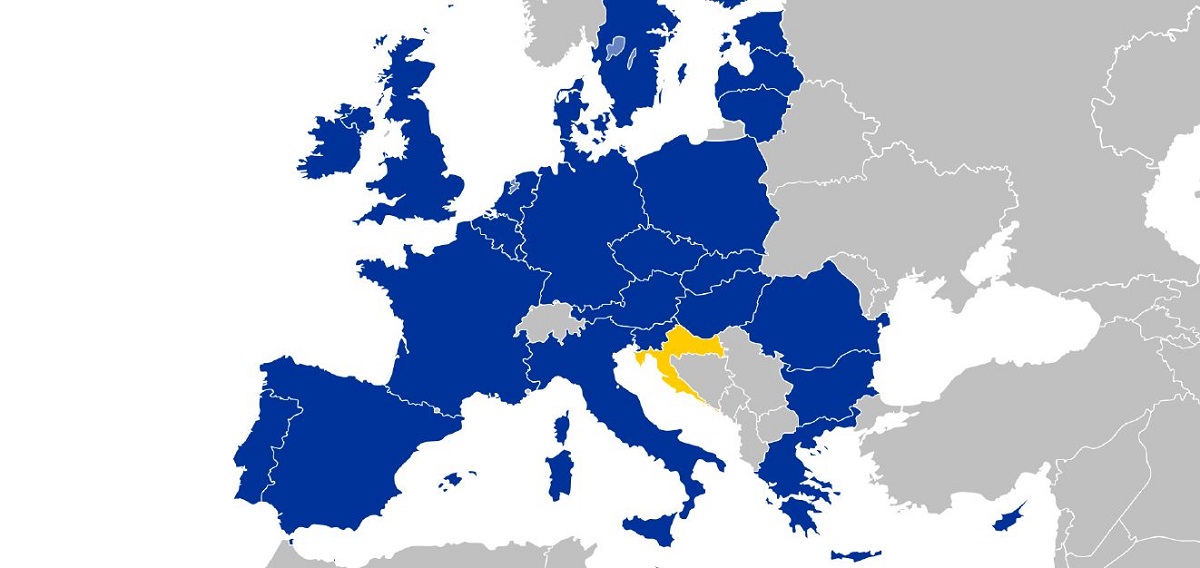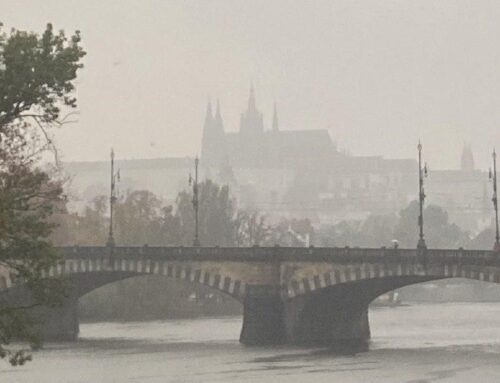Mare Soetermeer
Long before the outbreak of the Balkan Wars (1912-1913), nationalism had already begun to spread on the Balkan peninsula. Living under the rule of foreign kingdoms and empires from the 15th to the 19th century, had created a growing awareness in the region of ethno-national identities and the differences between them.(1) Many South-East Europeans tried to protect their ‘collective identities’ by following the ‘Self’ – ‘Other’ logic: only when spatial, temporal or ethical ‘Others’ exist, the ‘Self’ can be defined.(2) In the case of the Balkans, ‘Othering’ processes occurred mostly with respect to the region itself. Symbolically “departing from the Balkans” became an attractive way for nations to get rid of the negative features – primitive, uncivilised, and barbaric – their region was associated with, which would prove to be important later on, when the fall of Yugoslavia urged for the creation of new nation-states.(3)
For Croatia, it had been relatively easy to convince others of their apparent non-belonging to the Balkans. Being Catholic themselves and sharing a history with other former Austro-Hungarian countries, certainly made it easier for Croatians to find similarities with other (West-)European nations.(4) Therefore, it made sense that Croatia’s self-proclaimed “return to Europe” narrative took up a prominent role in the country’s Europeanization process and was put as an antithesis against their “remaining in the Balkans”.(5) In this latter frame, the Balkans were presented as Croatia’s spatial ‘Other’ – not only in geographical terms, but in terms of civilizational belonging and (economic) progress as well.(6)
The Balkans also engaged in temporal ‘Othering’, which refers to the seperation of a country’s (very) recent past from the present ‘Self’ in an exclusive way. This kind of ‘Othering’ gained specific popularity with the creation of the Socialist Federal Republic of Yugoslavia (1945), when the new regime understood the importance of erasing the NDH past from the Yugoslav imagination.(7) To prevent being considered ‘former Nazi’s’, the communists propagated the narrative of the ‘popular liberation struggle’ against Nazism at home and abroad.(8) Towards the end of Yugoslavia, this discourse was reversed, as Croatian and Serbian conservative elites, in a quest for power, turned to myths to discredit the communist regime they belonged to until a few years ago.(9) During this period, for the same reasons, elites also engaged in ethical ‘Othering’ by painting their opponents in neighbouring countries as unethical because of their inherent violent charachter.(10)
In times of political change, different ‘Othering’ processes served the identity formation of the dominant political powers. Some of these processes lost relevance during the transition period, but the ‘return to Europe’ frame continued to exist throughout the 1990s.(11) At the same time, the new “religious and ethno-nationalist”, Franjo Tuđman (HDZ),(12) was not very keen on materialising ‘European values’. Tuđman had a very hostile attitude towards the European Union, and regarded the Regional Approach Policy of the EU towards the Balkans as an aspiration by the West to create a neo-Yugoslavia (“EU = YU”).(13) In this discourse, the Croatians were again the victims of the ethical ‘Other’ that would steal their state autonomy and sovereignity: ‘Yugoslavia’ was just replaced by ‘Europe’, and ‘Belgrade’ by ‘Brussels’. The Tuđmanist attitude and policies “ultimately distanced Croatia from Europe and placed it firmly back in the ‘Balkans’, in a political sense”.(14)
Growing discontent with Tuđman’s autocratic policies and his passing in 2000, marked the end of conservative nationalism and the start of a progressive political wind. Under the presidency of Stjepan Mesić (HNS), Croatia deepened its East-European partnerships and warmed up towards the Vatican.(15) Croatia’s collective identity was now based on a ‘positive’ understanding of the future, and regional cooperation and EU membership continued to be prioritised with the election of Ivo Sanader as president.(16) The fact that the new president, who was from the same party as Tuđman, was willing to cooperate with the ICTY,(17) had been something unthinkable before. However, Sanader understood well that cooperation would provide Croatia not only EU membership, but also an opportunity to purge the negative aspects of the ‘Homeland War’. Finally, Croatia’s real
‘Self’ – the ‘legitimate defenders’ – could be distinguished from the war criminals known abroad.(18) The 2000s were thus marked by an identity transformation from a suspicious and fearful post-war victim of aggression to an “active promotor of change in the region and supporter of international institutions.”(19)
More than a decade has passed since Croatia received EU membership, but certain political trends seem to hinder the adoption of a ‘European identity’.(20) Croatia has been very determined to create a homogeneous nation by de facto including diaspora and excluding ‘non-Croat’ minorities, as illustrated by the (lack of) social rights given to them and the country’s ongoing ‘irredentist’ interferences in Bosnian politics, which, because of foreign policy reasons, are not condemned by either the EU or NATO.(21) Additionally, statements of current president Milanović about the ‘bad treatment’ of Croats inside Bosnia;(22) prime minister Andrej Plenković frequently referring to veterans as ‘Croatian heroes’;(23) the annual commemoration of ‘Operation Storm’;(24) and the ‘Homeland War’ being called the “birthplace of the modern nation”,(25) do not only reinforce the narrative that Croatia has always been a victim of the region, but also show the militaristic attitude of Croatia, which seems out of tone from the ‘pan-European peace project.’ Apparently one needs to share the narrative of the Homeland War to become part of the true Croatian ‘Self’; otherwise, one risks turning into the (ethical) ‘Other’.(26)
The Croatian ‘Self’ needs to be ethnically homogeneous, proud of its militaristic efforts, no matter the consequences, but also, like other post-communist East European countries, share the ideology of what some authors have dubbed ‘religious nationalism’.(27) During the neoliberal transition and Europeanization process, discourse began to spread about so-called European rights threatening the traditional Christian family. In these narratives, ‘European rights’ is often used as a synonym for LGBT rights, embodying the ethical ‘Other’.(28) Here, nationalism “has primarily meant emphasising its non-Balkan, non-Serb, and European elements, while at the same time supporting a Catholic identity that conflicts with some LGBT rights.”(29) Instances such as the decision of HDZ to close shops on Sunday to provide family time, indicate the joint struggle of political elites and the Catholic Church against gender equality.(30)
But how is all of this possible inside the ‘European space’? To begin with, the Croatian state discourse treats ‘Europe’ as an abstract concept – a ‘civilizational space’ – which enables politicians to promote certain progressive ideas in public, while at the same time questioning their legitimacy. Therefore, Plenković can describe the EU as a “community of values and rights” and refer to the importance of the protection of human and minority rights, but only offer concrete policy goals in the fields of green transition, digital space, and economic development.(31) This also works the other way around: violations of any ‘European’ norms are often not sanctioned by the EU, but rather “named and shamed”. The primarily economic character of the EU allows states to receive financial funding despite their scepticism towards some core European values and policies, such as the EU’s gender mainstreaming and anti-discrimination policies.(32) This also demonstrates that, ultimately, political decisions and policy outcomes depend on the “execution and sustainability of the discourse.”(33)
In short, Croatia’s state discourse illustrates how the creation of temporal, ethical, and spatial ‘Others’ reinforces the presumed democratic, developed, and progressive Croatian ‘Self’ that has been very important for maintaining the country’s state sovereignty and building political legitimacy. Despite all of this, Croatia’s membership in the ‘European community’ has not led to a full-fledged ‘European’ collective identity – quite the opposite in fact. The ethno-national politics and religious conservatism of current-day Croatia are able to expand inside the ‘European community’ because of the arbitrariness of the concept, and the non-intervention of the EU when it comes to norm violations. Therefore, the two largest collective identities in Croatia, religious nationalism and European democratic liberalism, can peacefully coexist. Croatia does not seem to be the only post-communist East-European country facing these political trends; it is up to the EU to keep the norms of the community in check if it desires to maintain a ‘European identity’ on its territory for the next years to come.
References:
(1) See: Glenny, Misha. 2012. The Balkans: Nationalism, War, and the Great Powers, 1804-2012.
Toronto: House of Anansi Press.
(2) Subotić, Jelena. 2011. ‘Europe Is a State of Mind: Identity and Europeanization in the Balkans1:
Europe Is a State of Mind’. International Studies Quarterly 55 (2): 309–30.
https://doi.org/10.1111/j.1468-2478.2011.00649.x.
(3) Blanuša, Nebojša. 2015. ‘Croatia between the “Return” to Europe and the “Remaining” in the
Balkans’. In Croatia and the European Union: Changes and Development, edited by Pero Maldini
and Davor Pauković. Farnham, England ; Burlington, VT: Ashgate.
(4) Bakić-Hayden, Milica. 1995. ‘Nesting Orientalisms: The Case of Former Yugoslavia’. Slavic Review
54 (4): 917–31. https://doi.org/10.2307/2501399.
(5) Blanuša, Nebojša. 2015.
(6) Zambelli, Nataša. 2010. ‘A Journey Westward: A Poststructuralist Analysis of Croatia’s Identity and
the Problem of Cooperation with the International Criminal Tribunal for the Former Yugoslavia’.
Europe-Asia Studies 62 (10): 1661–82. https://doi.org/10.1080/09668136.2010.522424.
(7) ‘Nezavisna Država Hrvatska’ (NDH), meaning ‘Independent State of Croatia’, was a Nazi puppet
regime that operated from 1941 to 1945. The victims of the regime were for the most part Jews, ethnic
Serbs, and Roma people.
(8) Milošević, Ana, and Heleen Touquet. 2018. ‘Unintended Consequences: The EU Memory
Framework and the Politics of Memory in Serbia and Croatia’. Southeast European and Black Sea
Studies 18 (3): 381–99. https://doi.org/10.1080/14683857.2018.1489614.
(9) One of the biggest myths is the ‘Bleiburg myth’, which refers to the killings by communists of defeated forces and associated civilians in 1945, which did not happen in Bleiburg, Austria, but somewhere else, and which have been grossly exaggerated in numbers. Bleiburg has been appropriated by extreme right forces as a symbol for the ‘inhumane nature’ of the communists.
(10) Gagnon, V. P. 2004. The Myth of Ethnic War: Serbia and Croatia in the 1990s. Ithaca, N.Y; London,
U.K.: Cornell University Press.
(11) Swimelar, Safia. 2019. ‘Nationalism and Europeanization in LGBT Rights and Politics: A
Comparative Study of Croatia and Serbia’. East European Politics and Societies: And Cultures 33 (3):
603–30. https://doi.org/10.1177/0888325418805135.
(12) Hrvatska Demokratska Zajednica (HDZ) is a conservative, centre-right, political party in Croatia.
(13) Jović, Dejan. 2012. ‘The War That Is Not Allowed to Be Forgotten: Nationalist Discourse on the
“Homeland War” (1991-1995) in Contemporary Croatia’. Südosteuropa Mitteilungen 3: 89.
(14) Ibid, 92.
(15) Sanader even thanked the Archbishop of Zagreb for his support for EU accession talks, which
without him “would not have happened”.
(16) Jović, Dejan. 2006. ‘Croatia and the European Union: A Long Delayed Journey’. Journal of
Southern Europe and the Balkans 8 (1): 85–103. https://doi.org/10.1080/14613190600595598.
(17) International Criminal Tribunal for the former Yugoslavia.
(18) Zambelli, 2010.
(19) Ibid, 1664.
(20) The ‘European identity’ can be broadly interpreted as a set of values and norms that belong to the
‘European community’, including a shared history and heritage, liberal democratic political and
economic institutions, and cultural values of diversity and inclusivity.
(21) Bojinović, Fenko, Ana, Soeren Keil, and Zlatko Šabič. 2023. ‘Europeans from the Start? Slovenia
and Croatia Between State-Building, National Identity and the European Union’. Journal of
Intervention and Statebuilding 17 (2): 136–55. https://doi.org/10.1080/17502977.2022.2162674.
(22) N1. 2022. ‘Milanović: Odnos Prema Hrvatima u BiH Trenutno Najveći Akutni Problem’, 29 July
2022.
(23) Republic of Croatia: Ministry of Foreign and European Affairs. “PM Plenković on 10 Years in EU:
Croatia Completely Transformed; We Have International Reputation, Our Voice Is Heard.”
template.gov.hr, June 19, 2023.
https://mvep.gov.hr/press-22794/pm-plenkovic-on-10-years-in-eu-croatia-completely-transformed-we
-have-international-reputation-our-voice-is-heard/257416.
(24) The final ‘victory’ of Croatia – the end of war – which led to the deportation and killings of many
Serbians in the region of Krajina.
(25) Jović, 2012, 58.
(26) Ibid, 60.
(27) Stubbs, Paul, and Noémi Lendvai-Bainton. 2020. ‘Authoritarian Neoliberalism, Radical
Conservatism and Social Policy within the European Union: Croatia, Hungary and Poland’.
Development and Change 51 (2): 540–60. https://doi.org/10.1111/dech.12565.
political decisions and policy outcomes depend on the “execution and sustainability of the
discourse.”
(28) In countries where the state identity is presented as incompatible with LGBT rights, such as in many
East-European countries, “wholesome” national values (state identity) are opposed to the “imagined
European queer periphery” (European identity).
(29) Swimelar, 2019, 607.
(30) Toma, Ivanka. 2023. ‘Zabrana Rada Nedjeljom Zapravo Ima Samo Jedan Cilj: I on Nema Veze s
Hrvatskom, Nego HDZ-Om’. Jutarnji List, 8 August 2023.
https://www.jutarnji.hr/vijesti/hrvatska/zabrana-rada-nedjeljom-zapravo-ima-samo-jedan-cilj-i-on-ne
ma-veze-s-hrvatskom-nego-hdz-om-15363094.
(31) Republic of Croatia: Ministry of Foreign and European Affairs, 2023.
(32) Stubbs, Paul, and Noémi Lendvai-Bainton. 2020.
(33) Zambelli, Nataša. 2010. ‘Između Balkana i Zapada: problem hrvatskog identiteta nakon Tuđmana i
diskurzivna rekonstrukcija regije’. Politička Misao 1: 57
Picture: Kolja21, https://en.wikipedia.org/wiki/2013_enlargement_of_the_European_Union;
https://creativecommons.org/licenses/by-sa/3.0





